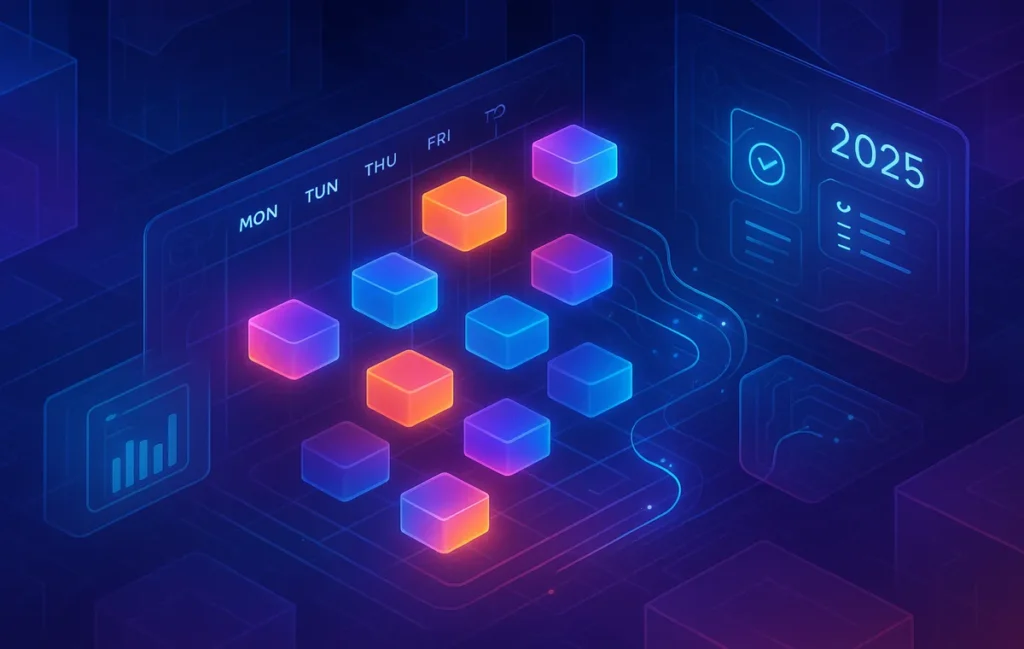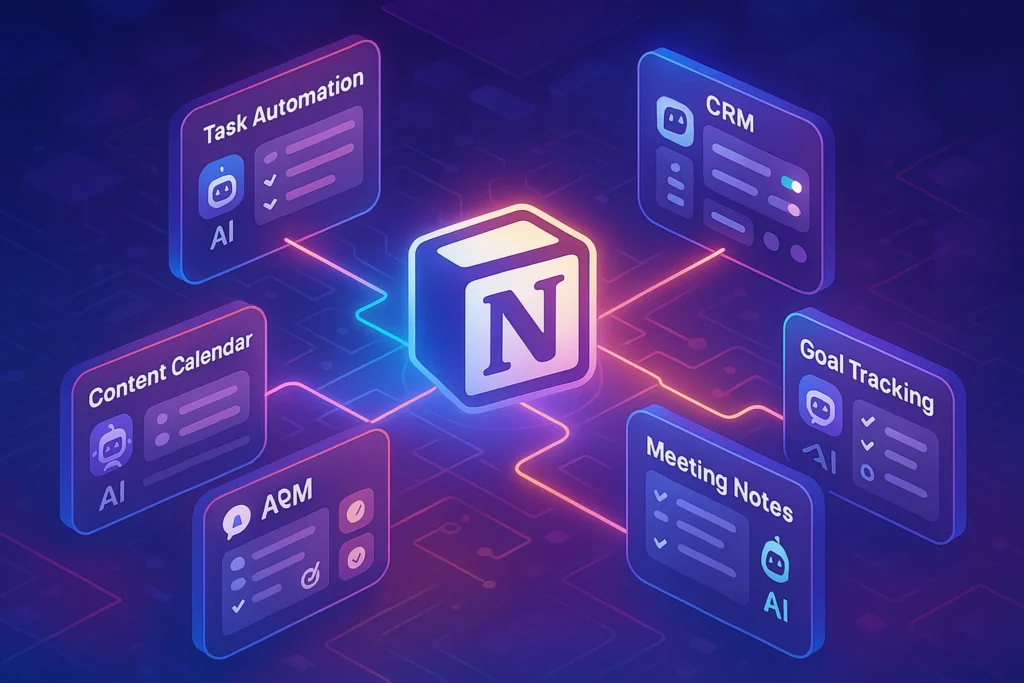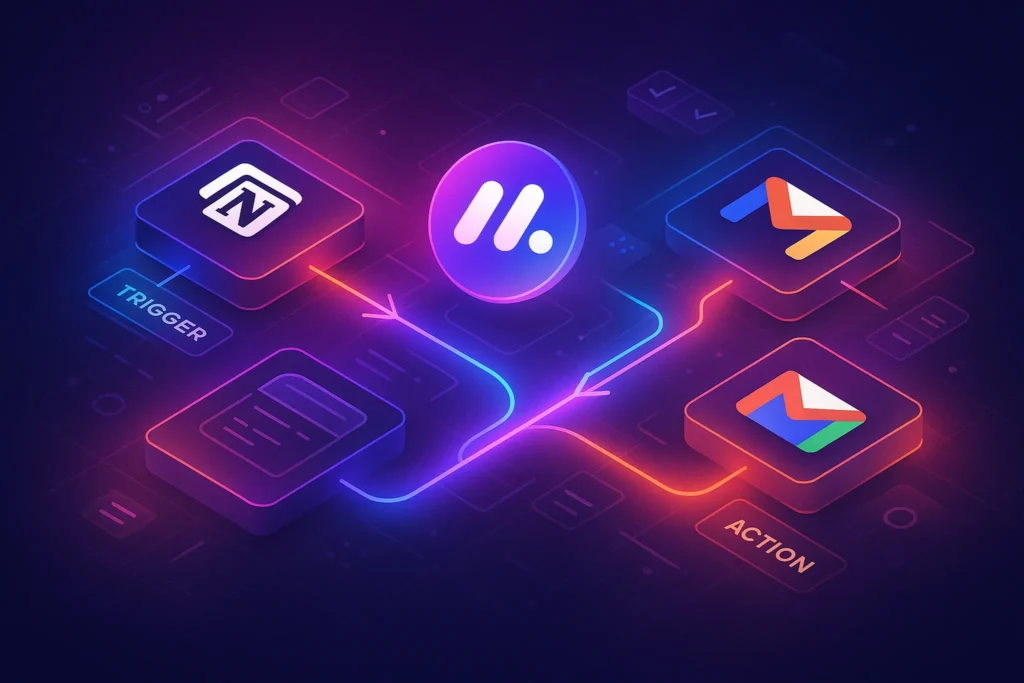⏰ Intro:
Time blocking isn’t just another productivity fad—it has become one of the most reliable methods for knowledge workers, creators, and teams to reclaim their schedules and build flow. In 2025, this method has matured from sticky notes and calendars to AI-powered tools that automatically carve your day into focused blocks, optimize priorities, and adapt in real time.
The right app doesn’t just schedule your tasks; it helps you defend your focus, keep distractions away, and measure output against goals. In this review, we’ll explore the best time-blocking apps of 2025—from Motion’s AI-driven calendar to Sunsama’s mindful planning rituals—so you can choose the tool that fits your workflow.
💡 Nerd Tip: Think of time-blocking apps as “productivity operating systems.” The app you pick will shape how your attention is allocated every single day.
🚀 Why Time-Blocking Apps Matter in 2025
The modern workday is fragmented by notifications, hybrid meetings, and Slack pings. Without a structured system, most people end up reacting instead of executing. Time-blocking apps provide a defense: they allocate focused blocks for deep work, create clarity on priorities, and prevent over-scheduling.
Unlike traditional calendars, today’s apps integrate with task managers, communication tools, and even predictive AI. For example, Motion automatically reorganizes your day when an urgent meeting pops up, while Sunsama encourages you to end each day by planning tomorrow’s tasks with intention. These apps also help measure true output: not just what’s on the calendar, but what actually got done.
💡 If you’re new to the concept of time blocking itself, you might first read our Beginner’s Guide to Time Blocking for Focus and Flow before choosing an app.
⚡ Motion: AI That Rebuilds Your Day in Real-Time
Motion has become the poster child of AI-powered time blocking. It doesn’t just hold your schedule; it actively manages it. Imagine assigning tasks without worrying about when you’ll do them—Motion finds open slots in your calendar, prioritizes high-value items, and rearranges everything if conflicts arise.
For freelancers, Motion eliminates decision fatigue. For teams, it ensures meetings don’t cannibalize focus blocks. Benchmarks from users show productivity gains of 20–30% simply by letting the tool decide when tasks should happen. But the biggest strength is adaptability: if you run behind, Motion re-blocks your calendar instantly.
💡 Nerd Tip: Pair Motion with a project management tool and let it pull tasks directly—this avoids double entry and keeps focus on execution, not planning.
🌅 Sunsama: The Mindful Planner for Focused Professionals
Sunsama takes a very different approach. Instead of maximizing every slot, it emphasizes balance and sustainability. Each day begins with a ritual: you review your tasks, drag only a realistic number into your schedule, and intentionally shut down when the workday ends.
This “calm productivity” model resonates with professionals burned out by rigid systems. In 2025, Sunsama integrates natively with Asana, Trello, and Jira, making it ideal for knowledge workers who need structured but humanized workflows. Its analytics reveal not just what you did, but whether your expectations matched reality—helping you refine focus over time.
Sunsama’s community often praises it as “a productivity therapist,” with one user on X noting: “Sunsama taught me that doing less but finishing it is more powerful than over-scheduling and failing.”
💡 For people deciding between different productivity techniques, our guide on Time Blocking vs Pomodoro shows how Sunsama’s daily ritual compares to micro-sprints.
🧭 Akiflow: The Task-Oriented Time Blocker
Akiflow is built for people who want strict task-to-calendar discipline. It centralizes tasks from multiple sources—email, Slack, project tools—and makes them drag-and-drop schedulable. Its superpower is time-to-task precision: instead of vague slots, you plan exactly when to complete each item, with keyboard shortcuts that make planning lightning-fast.
In 2025, Akiflow has leaned heavily into integrations with Google Calendar and Notion, making it easy for hybrid teams to synchronize. For remote professionals juggling multiple clients, Akiflow’s unified inbox and scheduling save hours otherwise lost to context switching.
💡 Nerd Tip: Use Akiflow’s command bar to schedule tasks instantly without breaking flow. The less time you spend planning, the more time you spend executing.
🕹️ Reclaim.ai: Smart Habits + Calendar Harmony
Reclaim.ai focuses on defending habits and recurring routines inside your calendar. Instead of just blocking tasks, it ensures time for workouts, lunch, and deep work—automatically protecting these from being swallowed by meetings.
Its AI negotiates with your team calendar: if someone tries to book over your focus block, Reclaim flexes but reassigns the habit elsewhere. By analyzing weekly patterns, it shows whether you’re truly honoring the balance you wanted. For startups, this means fewer lost mornings to back-to-back calls and more predictable energy.
Case study: a small dev team reported that Reclaim reduced “calendar chaos” by 40%, helping them hit sprint deadlines without late nights.
📅 Google Calendar Hacks: Still the Underdog Weapon
Even with dedicated tools, Google Calendar remains a time-blocking workhorse in 2025. With custom color-coding, recurring events, and AI-powered scheduling add-ons, it transforms into a lightweight blocker for those unwilling to pay for new platforms.
Hacks like creating “focus event templates,” embedding task links inside events, or syncing with tools like Zapier for automation keep Google Calendar competitive. For solopreneurs or budget-conscious users, these hacks may be enough to replicate much of what premium apps offer.
💡 Curious how calendar tools tie into marketing or content systems? Check out Monday Content Planning where time-blocking connects to broader strategy.
🎨 Quick Comparison Snapshot
| App | Strengths | Best For |
|---|---|---|
| Motion | AI re-prioritization, zero manual load | Fast-paced professionals, teams |
| Sunsama | Mindful planning, realistic workloads | Creators, remote knowledge work |
| Akiflow | Task-to-calendar precision | Freelancers, multi-client pros |
| Reclaim | Habit defense, smart routines | Startup teams, hybrid workers |
| Google Calendar | Budget hacks, wide adoption | Students, early-stage founders |
💡 Nerd Tip: Choose based on philosophy—do you want AI to manage your day (Motion), or do you want rituals to manage yourself (Sunsama)?
⚡ Ready to Build Smarter Workflows?
Explore AI workflow builders like Motion, Sunsama, and Akiflow to defend your focus and maximize your output. Your calendar should serve you—not the other way around.
📊 Benchmarks & Case Studies: Proof That Time Blocking Works
Time-blocking apps aren’t just productivity hype—they deliver measurable results. In 2025, several benchmarks show clear gains: Motion’s AI-driven scheduling users report up to 30% higher task completion rates compared to manual calendar users. A remote SaaS team of twelve shared that after adopting Motion, deep work hours increased by 22% per week because meetings no longer clashed with focus blocks.
Sunsama shows a different kind of success. Instead of more tasks, it focuses on realistic planning. Their user data reveals that professionals complete 18% more of their planned tasks daily because they commit to fewer but more achievable blocks. That’s the essence of sustainable productivity: feeling accomplished, not overcommitted.
Case studies like these demonstrate the ROI of adopting structured time-blocking tools. It’s not just about being busy; it’s about aligning effort with meaningful output.
💡 Nerd Tip: Look beyond vanity metrics like hours “scheduled.” Instead, measure how many blocks you actually complete without deferring—that’s the truest benchmark of focus.
🔗 Integration Ecosystem: Where Time-Blocking Meets Your Workflow
The strength of modern time-blocking apps lies in how seamlessly they integrate with the tools you already use. Motion and Akiflow pull tasks directly from project management apps like Asana, Trello, or Jira, meaning you never have to manually duplicate work. Sunsama allows you to review your Slack messages or Gmail inbox during daily planning, dragging actionable items straight into your schedule.
Reclaim goes further by integrating with Google Workspace and Microsoft Teams calendars, automatically balancing personal routines like workouts and breaks alongside corporate meetings. Even Google Calendar hacks become powerful when paired with automation platforms—through connectors like Zapier or Make, you can auto-block deep work time whenever a new task is added in Notion.
These integrations matter because no one wants yet another siloed app. The best time-blocking software turns your calendar into the central hub of your productivity ecosystem, unifying tasks, communications, and commitments in one place.
💡 Nerd Tip: Before choosing an app, map your current ecosystem. If you live in Slack and Notion, Sunsama fits. If your life revolves around Jira and sprint planning, Motion or Reclaim may serve better.
💬 User Voices: How People Actually Feel Using These Tools
The real test of any productivity app isn’t its features—it’s the lived experience of its users. On X (formerly Twitter), Motion users often describe the app as having a “Chief of Staff in your pocket.” One user wrote: “Motion reorganizes my day 10 times and I don’t stress. It feels like someone’s got my back.”
Sunsama fans tell a different story. They praise its mindfulness: “At 6 pm, Sunsama literally told me: stop working. I closed my laptop without guilt for the first time in months.” This emotional layer is powerful—Sunsama isn’t just about tasks, it’s about peace of mind.
Akiflow users celebrate its speed: “The command bar is the fastest way I’ve ever scheduled tasks. It’s like using Spotlight for your productivity.” Meanwhile, Reclaim users often note how it protects habits: “Reclaim made sure I never skip my morning run—even when my boss rescheduled our weekly stand-up.”
Hearing directly from users shows that these apps aren’t abstract tools—they shape daily emotions, behaviors, and even stress levels.
⚠️ Pitfalls & Limitations: Where Time Blocking Can Go Wrong
No tool is perfect, and knowing the limitations helps set realistic expectations. Motion, for instance, can feel too aggressive for some. When the AI constantly reshuffles tasks, users sometimes feel they’ve lost control of their own schedule. If you crave stability over optimization, this can be frustrating.
Sunsama’s ritualistic approach can feel slow-paced to productivity maximalists. If you love heavy automation and instant AI suggestions, Sunsama may feel too manual. It’s a trade-off between mindful planning and raw efficiency.
Google Calendar hacks remain powerful, but they demand personal discipline. Without AI guardrails, it’s easy to over-schedule or ignore your own blocks. For some, this ends in calendar clutter rather than clarity.
Even integrations can introduce friction. Akiflow, while fast, requires careful setup to avoid inbox overload. Reclaim’s auto-flexing habits sometimes confuse team members who don’t understand why your calendar “keeps changing.”
💡 Nerd Tip: View time-blocking apps as assistants, not dictators. The best results come when you let the app guide you but keep the final say over your day.
📬 Want More Smart AI Tips Like This?
Join our free newsletter and get weekly insights on AI tools, productivity hacks, and future tech—delivered straight to your inbox. No fluff. Just high-quality content for creators, founders, and focused professionals.
🔐 100% privacy. No noise. Just value-packed content tips from NerdChips.
🧠 Nerd Verdict
Time blocking has shifted from being a personal discipline to a technology-powered edge. The apps of 2025 bring AI, integrations, and behavioral insights into play, letting professionals not only plan their days but actively protect their focus.
At NerdChips, our take is simple: pick the app that fits your philosophy. If you thrive on automation, Motion is unbeatable. If you value balance, Sunsama is your ally. If you need control, Akiflow wins. And if budget matters, Google Calendar hacks still deliver.
The best app is the one that ensures your best hours go to your best work.
❓ FAQ: Nerds Ask, We Answer
💬 Would You Bite?
Would you trust an AI like Motion to fully rebuild your day—or do you prefer the mindful ritual of Sunsama to stay in control?
Crafted by NerdChips for creators and teams who want their best ideas to travel the world.



